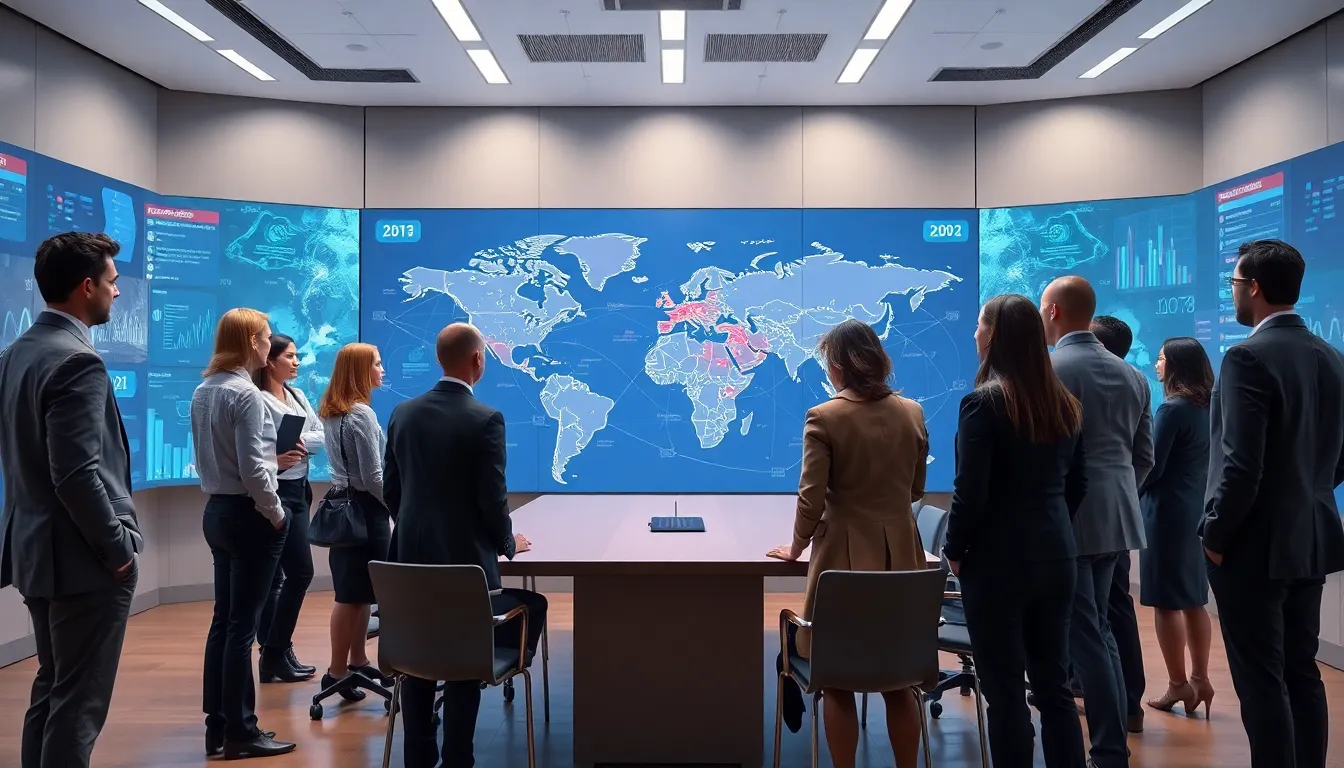In an increasingly interconnected world, international security has become a pivotal concern for nations and organizations alike. As threats evolve—from cyber warfare to terrorism—the need for robust security measures is more pressing than ever. Countries must navigate complex geopolitical landscapes while fostering cooperation and trust among allies to maintain peace and stability.
The dynamics of international security are shaped by a myriad of factors, including political, economic, and social influences. Understanding these elements is crucial for developing effective strategies to address current challenges. This article delves into the key aspects of international security, exploring its significance, the emerging threats, and the collaborative efforts necessary to build a safer global environment.
Table of Contents
ToggleOverview of International Security
International security encompasses the measures made by states and international organizations to ensure mutual survival and safety. This domain addresses threats posed by terrorism, transnational crime, cyber warfare, and nuclear proliferation, among others.
Several frameworks guide international security efforts:
- Bilateral Agreements: Countries establish treaties to address specific threats collaboratively. For example, the United States and Russia sign agreements to limit nuclear arms, enhancing transparency and trust.
- Multilateral Organizations: Entities like the United Nations and NATO foster dialogue and cooperation among nations. These organizations play vital roles in conflict resolution and peacekeeping missions.
- Regional Security Arrangements: Regional coalitions, such as the African Union and the European Union, address security concerns pertinent to their specific regions. These groups facilitate joint training exercises and intelligence-sharing initiatives.
- Security Policies: Nations develop comprehensive security strategies based on assessments of their vulnerabilities and threats. Effective security policies often incorporate diplomatic, military, and economic measures.
Understanding these frameworks is crucial for addressing the multitude of challenges within the sphere of international security. As global dynamics evolve, so too must the strategies employed to secure peace and stability.
Key Challenges in International Security

International security faces numerous challenges that demand immediate attention and strategic responses. These challenges include terrorism, cybersecurity threats, and the proliferation of weapons of mass destruction.
Terrorism and Violent Extremism
Terrorism and violent extremism pose significant threats to national and global security. Various groups, including ISIS and al-Qaeda, continue to operate across borders, exploiting political instability and social unrest. In 2021, global terrorism-related deaths exceeded 30,000, indicating the ongoing severity of this issue. Countries must collaborate on intelligence sharing and counterterrorism initiatives to combat this menace effectively.
Cybersecurity Threats
Cybersecurity threats have intensified as technology advances. Cyberattacks originated from state actors and non-state actors target essential infrastructure, financial systems, and sensitive personal data. The FBI reported a 300% increase in reported cybercrimes during the COVID-19 pandemic period. Nations must prioritize establishing robust cybersecurity frameworks and international norms to mitigate these risks.
Proliferation of Weapons of Mass Destruction
The proliferation of weapons of mass destruction, including nuclear, biological, and chemical weapons, remains a critical concern. Nine countries possess nuclear arsenals, with an estimated total of over 13,000 nuclear warheads globally. Treaties such as the Non-Proliferation Treaty (NPT) strive to prevent the spread of these weapons, but ongoing tensions in regions like North Korea and Iran highlight the complexities. Enhanced diplomatic efforts and compliance mechanisms are essential to address these challenges effectively.
The Role of Global Institutions
Global institutions play a critical role in enhancing international security through cooperation, dialogue, and strategic frameworks. Organizations such as the United Nations and NATO are central to addressing global challenges and fostering peace.
United Nations and Peacekeeping
The United Nations (UN) serves as the primary platform for international diplomacy and conflict resolution. It employs peacekeeping missions to stabilize regions experiencing violent conflict. Currently, over 12,000 personnel are deployed in UN peacekeeping missions worldwide, facilitating ceasefires and promoting political dialogue. The UN Security Council, with its ability to impose sanctions or authorize military action, plays a vital role in maintaining international security standards. Furthermore, the UN’s commitment to human rights and development aids in addressing the root causes of conflict, enhancing long-term stability in troubled regions.
NATO and Collective Defense
The North Atlantic Treaty Organization (NATO) exemplifies collective defense through its mutual defense agreement established under Article 5 of the NATO treaty. This principle asserts that an attack against one member constitutes an attack against all. Currently, NATO consists of 31 member nations, working collaboratively to deter aggression and enhance security. Recent developments, such as the increased military presence in Eastern Europe, demonstrate NATO’s adaptability in response to emerging threats, particularly from state actors. Additionally, NATO’s partnerships with non-member states extend its influence and assist nations in strengthening their defense capabilities through joint exercises and training programs.
Regional Security Dynamics
Regional security dynamics play a crucial role in shaping international security. Different areas of the world face unique challenges that require tailored responses and cooperative strategies.
Asia-Pacific Security Landscape
The Asia-Pacific region is characterized by rising tensions amid territorial disputes and military modernization. Key players include China, which has expanded its military presence in the South China Sea, and the United States, which maintains strategic alliances with nations like Japan and Australia to counterbalance Chinese influence. North Korea’s nuclear ambitions add complexity, prompting calls for enhanced diplomatic engagement and multilateral efforts to denuclearize the Korean Peninsula. According to reports, military spending in Asia increased by 3.9% in 2022, reflecting heightened security concerns.
European Security Issues
The European security landscape faces challenges from both internal and external threats. The resurgence of Russian military actions in Ukraine has prompted countries within NATO to bolster their defenses, with several nations increasing their military budgets by 2% of GDP. Moreover, the migration crisis and rising nationalist sentiments strain EU cohesion, complicating collective responses to security threats. Cybersecurity threats also loom large, with over 200 significant cyber incidents reported in Europe in 2021, highlighting the need for robust cybersecurity frameworks.
Middle East Tensions
The Middle East remains a hotbed of political and military conflicts, impacting regional and global security. Ongoing hostilities involving Iran, Israel, and various non-state actors exacerbate instability. The Syrian conflict has seen over 500,000 fatalities since its onset, while the rise of groups like ISIS continues to threaten peace in the region. The Abraham Accords, normalizing relations between Israel and several Arab states, offer a potential path toward stability, yet underlying tensions and disputes remain. International efforts to mediate negotiations are essential for achieving lasting peace.
Emerging Trends in International Security
Emerging trends in international security highlight the evolving nature of threats and the adaptive strategies required for effective responses. Two significant areas of focus include the impact of climate change and technological advancements.
Impact of Climate Change
Climate change significantly influences international security by exacerbating resource scarcity, amplifying natural disasters, and forcing relocations. Increased temperatures and shifting weather patterns lead to water shortages, impacting agricultural productivity and creating potential conflicts over resources. For example, the United Nations projects that by 2040, more than 50% of the global population may experience severe water stress. Additionally, climate-induced migration increases tensions in host countries, which struggle to accommodate growing populations. Consequently, nations must integrate climate considerations into their security strategies and prioritize cooperation to address the consequences of climate change effectively.
Technological Advancements
Technological advancements continuously reshape the landscape of international security, offering both opportunities and risks. Innovations in artificial intelligence, drones, and cyber capabilities enhance military effectiveness and intelligence gathering. For instance, AI can optimize surveillance, allowing for quicker response times to emerging threats. However, such technology also raises concerns about cyber warfare and the potential for autonomous weapons systems to operate without human oversight. The proliferation of cyber capabilities, evidenced by a 300% increase in cybercrimes since the COVID-19 pandemic, emphasizes the urgency for international norms that govern their use. Nations are urged to collaborate on developing frameworks that address both the benefits and dangers posed by these technologies, ensuring a stable global security environment.
International security remains a dynamic and multifaceted field that demands constant vigilance and cooperation among nations. As threats evolve and new challenges emerge the importance of strategic frameworks and collaborative efforts cannot be overstated. Countries must prioritize partnerships and dialogue to effectively address issues like terrorism cyber threats and the proliferation of weapons of mass destruction.
The integration of climate considerations and technological advancements into security strategies will be crucial for future stability. By fostering a comprehensive understanding of these elements nations can better navigate the complexities of global security. Ultimately the pursuit of peace and stability relies on a united effort to confront these pressing challenges head-on.






